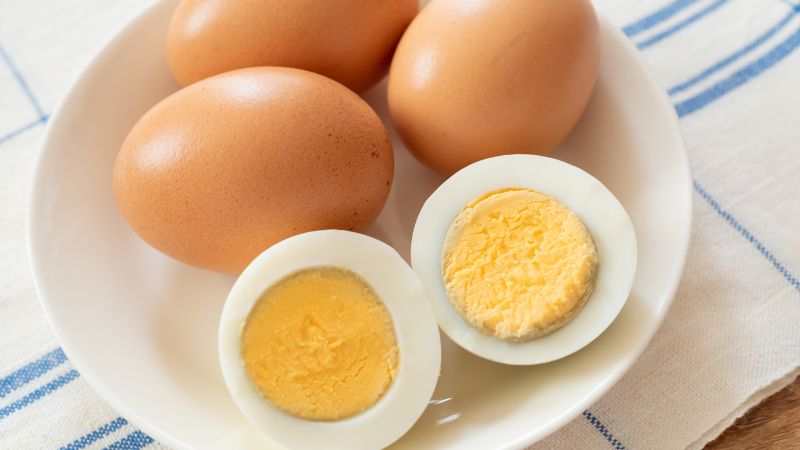Boiled eggs are a great way to feel fuller for longer and curb those hunger pangs. For a quick and nutritious weight loss solution, simply add boiled eggs to your daily diet and see the results. Let’s explore the benefits and considerations of using boiled eggs as a weight loss tool!
1 How Many Calories Are in a Boiled Egg?
According to the United States Department of Agriculture (USDA), 100g of boiled eggs contain approximately 155 kcal along with a variety of other nutrients:
- Fat: 11g
- Cholesterol: 373 mg
- Sodium: 124 mg
- Potassium: 126 mg
- Carbohydrates: 1.1g
- Protein: 13g
- Calcium: 1.2 mg
- Iron: 0.1 mg
- Vitamin C: 10mg
- Vitamin A: 50mg
- Vitamin D: 87 IU
- Vitamin B12: 1,1 µg
 100g of boiled eggs contain approximately 155 kcal
100g of boiled eggs contain approximately 155 kcal
Additionally, the health website Hellobacsi provides specific calorie information for different types of eggs:
- Boiled quail eggs: 77 calories/egg (50g)
- Boiled chicken eggs: 130 calories/egg (70g)
- Boiled duck eggs: 14 calories/egg (9g)
2 Do Boiled Eggs Help With Weight Loss?
Research presented at the European Congress on Obesity in Lyon, France, suggests that boiled eggs are low in calories while providing essential nutrients for the body. As a result, they are an ideal food choice for individuals aiming to lose weight.
On average, an egg contains 70 calories, with the yolk containing 13.6% protein, 29.8% fat, and 1.6% other minerals. The egg white, on the other hand, contains 10.3% of the essential protein your body needs. Incorporating boiled eggs into your daily diet means successfully reducing your calorie intake while still meeting your nutritional requirements.
 Do boiled eggs help with weight loss?
Do boiled eggs help with weight loss?
Consuming boiled eggs will make you feel fuller for longer, and when you’re not hungry, you’re less likely to reach for snacks, thus curbing the intake of additional calories from cookies and cakes. This will help accelerate your weight loss journey.
A study involving 20 obese individuals found that those who ate one boiled egg for breakfast experienced reduced hunger during lunch. This is because the protein in eggs helps dieters stay satisfied and full, enabling them to better adhere to their weight loss regimen.
3 Things to Keep in Mind When Using Boiled Eggs for Weight Loss
- Avoid overeating yolks as they contain high levels of cholesterol. Excessive consumption can lead to elevated cholesterol levels in the body.
- Include boiled eggs in your weight loss menu, but limit fried or sunny-side-up eggs.
- Combine eggs with a variety of other foods to increase fiber intake and ensure a balanced diet.
- For individuals with liver diseases, high blood fat, cardiovascular issues, or hypertension, it is recommended to limit egg consumption to 2–3 eggs per week.
- Eat eggs in the morning for optimal weight loss results.
 Things to keep in mind when using boiled eggs for weight loss
Things to keep in mind when using boiled eggs for weight loss
is a popular choice for many people looking to shed some pounds. However, for faster results, it’s important to combine this approach with a healthy diet and regular exercise. Good luck on your fitness journey!
Sources: Vinmec.com, health website Hellobasi































